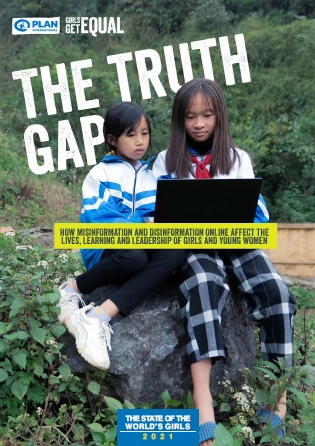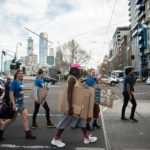Media Centre - 5 October 2021
In the COVID-19 world, online lies leave girls fearing for their safety – as the biggest ever global survey of its kind finds false information is severely impacting their lives

False information online has left one in five girls (20%) feeling physically unsafe, according to The Truth Gap, a new report released today by Plan International Australia, the charity for girls equality.
The research includes a landmark survey of over 26,000 girls and young women from 26 countries, which also found that exposure to lies and mistruths are having a profound impact on how they engage with issues ranging from COVID-19 to politics.
In Australia, 95% of girls and young women surveyed said they were concerned about misinformation or disinformation online, while 83% said they had been exposed to false or misleading information.
More than half of the Australian girls surveyed (53%) said that misinformation, lies and conspiracies about COVID-19 was most prevalent, followed by climate change (38%) and racial justice (37%).
In-depth interviews carried out by Plan International suggest that girls are feeling unsafe because online exchanges are increasing social tensions within communities.
Others reported concerns about bogus events advertised on social media placing them at physical risk, or unreliable medical advice that could harm their health or impact their confidence in legitimate medical advice.
More than a quarter (28%) of those surveyed have been led to believe a myth or ‘fake fact’ about COVID-19, and one in four (25%) have questioned whether to get vaccinated against the virus.
Girls and young women from low and middle-income countries were more likely to be affected by unreliable or false information online, and twice as likely to have questioned whether to get the vaccine (31%) than those in high income countries (16%).
One in five (19%) say mistruths are so rife that they have distrusted election results, while one in five (18%) have stopped engaging in politics or current affairs as a result.
The pandemic has driven all of us to live more of our lives online – especially young people. But as we navigate through the biggest moment of digital change the world has seen, it is critical that the support, safety and resources girls in all their diversities need to combat misinformation and to thrive in this new world are put in place.
Plan International Australia, which says the findings lay bare the ‘real life consequences’ of misinformation and disinformation on girls and young women, is calling on governments to educate children and young people in digital literacy.
One in three report that false information is affecting their mental health, leaving them feeling stressed, worried and anxious.
In this the first large-scale global study to examine the gendered impact of misinformation and disinformation online, it was found that nearly nine in 10 (87%) of girls and young women think it has had a negative impact on their lives.
Australian findings
In Australia, 1001 girls and young women aged 15 – 24 were surveyed as part of the global research. On many measures, they fared worse than the global average. The Australian data showed:
• 95% are concerned about misinformation and/or disinformation online. Four out of ten (41 %) are extremely or very concerned about it.
• 83% said they have seen misinformation and/or disinformation online. The topic that most girls and young women have seen misinformation and/or disinformation on is COVID-19 (53%), followed by climate change (38%) and racial justice (37%).
• Misinformation and disinformation online have serious effects on girls and young women, with more than eight out of ten saying that misinformation and/or disinformation had a negative effect on them (86%).
• Seven out of ten girls and young women who participated in the survey have seen misinformation/disinformation on social media platforms (70%). Other platforms where they spotted misinformation/disinformation are video sharing platforms (51%) forums and message boards (36%) and blogs (36%). 35% of girls and young women have found misinformation on Wikipedia or other wiki pages and search engines
• Only 6% of the girls and young women who participated in the survey said that no social media platform has misinformation and/or disinformation. The majority (59%) believe that Facebook is the social media platform with the most misinformation/disinformation, whilst 34% of girls and young women feel that TikTok and 31% feel that Instagram and Twitter are the platforms with the most misinformation/disinformation.
• 50% of the surveyed girls and young women feel able to spot misinformation or disinformation online.
• 67% of girls and young women have never been taught how to identify misinformation and/or disinformation at school, and 75% have never been taught by their parents; 84% have never been taught about spotting misinformation by social media platforms and 89% by government institutions.
• Girls and young women feel that governments (21%), social media companies (21%) and news and media companies (15%) should primarily be responsible for identifying and countering misinformation and/or disinformation online.
Globally, there was no online source that the majority of those surveyed trusted to provide reliable information.
The most trusted source was mainstream news media, selected by 48%, above educational institutions, family members and national governments.
The survey found that Facebook was the social media platform that girls believe to have the most misinformation and disinformation, selected by 65% of respondents, followed by TikTok, WhatsApp and YouTube – all at 27%.
Susanne Legena, CEO of Plan International Australia said:
“The internet shapes girls’ opinions about themselves, the issues they care about and the world around them. Our research makes clear that the spread of false information online has real life consequences. It is dangerous, it affects girls’ mental health, and it’s yet another thing holding them back from engaging in public life.
“Every day, girls and young women in all their diversity are bombarded online with lies and stereotypes about their bodies, who they are and how they should behave. Images and videos are manipulated to objectify and shame them. Rumours are spread as a form of abuse. And girls have a very real fear that fake events and profiles will lure and trick them into danger offline.”
As part of its Girls Get Equal campaign, Plan International is supporting girls worldwide in calling on governments to take immediate action to increase children and young people’s digital literacy, equipping them with the knowledge and skills to identify false information and engage confidently in online spaces.
The organisation’s survey found that seven out of 10 girls and young women (67%) have never been taught how to spot misinformation or disinformation at school.
A global petition has been launched to build support for more digital literacy education. The girls’ petition can be signed at this link: www.plan.org.au/publications/the-truth-gap
*ENDS*
For further comment or PDFs of the report or the Australian survey findings please contact Plan International Australia media and ambassador manager James Norman on 0451291775 or media and public relations advisor Claire Knox on 0452326549
Media contacts


